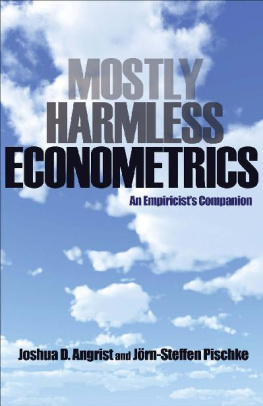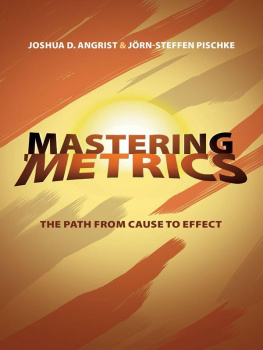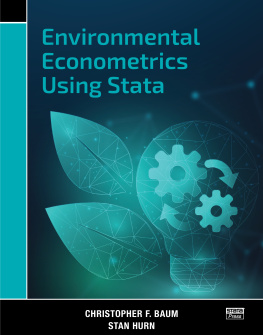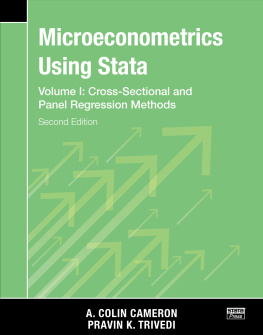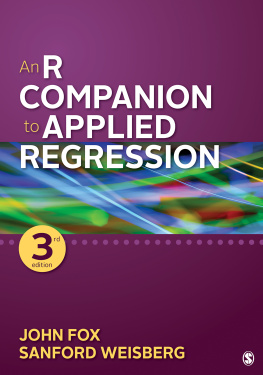Mostly Harmless Econometrics

Mostly Harmless Econometrics
An Empiricists Companion

Joshua D. Angrist
and
Jrn-Steffen Pischke
PRINCETON UNIVERSITY PRESS PRINCETON AND OXFORD
Copyright 2009 by Princeton University Press
Published by Princeton University Press, 41 William Street,
Princeton, New Jersey 08540
In the United Kingdom: Princeton University Press,
6 Oxford Street, Woodstock, Oxfordshire OX20 1TW
All Rights Reserved
Library of Congress Cataloging-in-Publication Data
Angrist, Joshua David.
Mostly harmless econometrics : an empiricists companion / Joshua D. Angrist, JrnSteffen Pischke.
p. cm.
Includes bibliographical references and index.
ISBN 978-0-691-12034-8 (hardcover : alk. paper) ISBN 978-0-691-12035-5 (pbk. : alk. paper) 1. Econometrics. 2. Regression analysis. I. Pischke, JrnSteffen. II. Title.
HB139.A54 2008
330.015195dc22 2008036265
British Library Cataloging-in-Publication Data is available
This book has been composed in Sabon with Hel. Neue Cond. family display
Illustrations by Karen Norberg
Printed on acid-free paper.
press.princeton.edu
Printed in the United States of America
1 3 5 7 9 10 8 6 4 2
CONTENTS

FIGURES

TABLES

PREFACE

T he universe of econometrics is constantly expanding. Econometric methods and practice have advanced greatly as a result, but the modern menu of econometric methods can seem confusing, even to an experienced number cruncher. Luckily, not everything on the menu is equally valuable or important. Some of the more exotic items are needlessly complex and may even be harmful. On the plus side, the core methods of applied econometrics remain largely unchanged, while the interpretation of basic tools has become more nuanced and sophisticated. Our Companion is an empiricists guide to the econometric essentials Mostly Harmless Econometrics.
The most important items in an applied econometricians toolkit are:
1. Regression models designed to control for variables that may mask the causal effects of interest;
2. Instrumental variables methods for the analysis of real and natural experiments;
3. Differences-in-differences-type strategies that use repeated observations to control for unobserved omitted factors.
The productive use of these basic techniques requires a solid conceptual foundation and a good understanding of the machinery of statistical inference. Both aspects of applied econometrics are covered here.
Our view of whats important has been shaped by our experience as empirical researchers, and especially by our work teaching and advising economics Ph.D. students. This book was written with these students in mind. At the same time, we hope the book will find an audience among other groups of researchers who have an urgent need for practical answers regarding choice of technique and the interpretation of research findings. The concerns of applied econometrics are not fundamentally different from those of other social sciences or epidemiology. Anyone interested in using data to shape public policy or to promote public health must digest and use statistical results. Anyone interested in drawing useful inferences from data on people can be said to be an applied econometrician.
Many textbooks provide a guide to research methods, and there is some overlap between this book and others in wide use. But our Companion differs from econometrics texts in a number of important ways. First, we believe that empirical research is most valuable when it uses data to answer specific causal questions, as if in a randomized clinical trial. This view shapes our approach to most research questions. In the absence of a real experiment, we look for well-controlled comparisons and/or natural quasi-experiments. Of course, some quasi-experimental research designs are more convincing than others, but the econometric methods used in these studies are almost always fairly simple. Consequently, our book is shorter and more focused than textbook treatments of econometric methods. We emphasize the conceptual issues and simple statistical techniques that turn up in the applied research we read and do, and illustrate these ideas and techniques with many empirical examples.
A second distinction we claim is a certain lack of gravitas. Most econometrics texts appear to take econometric models very seriously. Typically these books pay a lot of attention to the putative failures of classical modeling assumptions, such as linearity and homoskedasticity. Warnings are sometimes issued. We take a more forgiving and less literal-minded approach. A principle that guides our discussion is that the estimators in common use almost always have a simple interpretation that is not heavily model dependent. If the estimates you get are not the estimates you want, the fault lies in the econometrician and not the econometrics! A leading example is linear regression, which provides useful information about the conditional mean function regardless of the shape of this function. Likewise, instrumental variables methods estimate an average causal effect for a well-defined population even if the instrument does not affect everyone. The conceptual robustness of basic econometric tools is grasped intuitively by many applied researchers, but the theory behind this robustness does not feature in most texts. Our Companion also differs from most econometrics texts in that, on the inference side, we are not much concerned with asymptotic efficiency. Rather, our discussion of inference is devoted mostly to the finite-sample bugaboos that should bother practitioners.
The main prerequisite for understanding the material here is basic training in probability and statistics. We especially hope that readers are comfortable with the elementary tools of statistical inference, such as t-statistics and standard errors. Familiarity with fundamental probability concepts such as mathematical expectation is also helpful, but extraordinary mathematical sophistication is not required. Although important proofs are presented, the technical arguments are not very long or complicated. Unlike many upper-level econometrics texts, we go easy on the linear algebra. For this reason and others, our Companion should be an easier read than competing books. Finally, in the spirit of Douglas Adamss lighthearted serial (The Hitchhikers Guide to the Galaxy and Mostly Harmless, among others) from which we draw continued inspiration, our Companion may have occasional inaccuracies, but it is quite a bit cheaper than the many versions of the Encyclopedia Galactica Econometrica that dominate todays market. Grateful thanks to Princeton University Press for agreeing to distribute our
Next page
